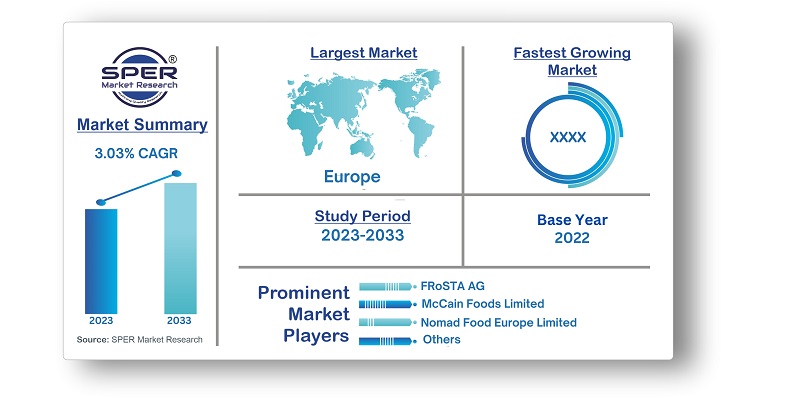
Europe Frozen Food Market Growth, Trends, Size, Scope, Revenue and Future Competition Till 2033
Europe Frozen Food Market Size- By Product, By Type, By End User- Regional Outlook, Competitive Strategies and Segment Forecast to 2033
| Published: May-2023 | Report ID: FOOD2344 | Pages: 1 - 156 | Formats*: |
| Category : Food & Beverages | |||
- August 2022: Yogurtland expanded its operations by introducing a new, temporary Watermelon Sorbet with the flavour reminiscent of Sour Patch Kids Candy.
- June 2022: A UK-based plant-based food brand, THIS, expanded its frozen food offerings with products like THIS Isn't Chicken Tenders, THIS Isn't Pork Sausages, and THIS Isn't Chicken Nuggets, now sold at Sainsbury's stores nationwide.

- Opportunities: The European frozen food market is experiencing significant opportunities due to the increasing popularity of e-commerce. Online retailers leverage their digital capabilities to offer a wider range of frozen food products and deliver them directly to consumers' homes, capitalizing on the convenience of online ordering and real-time tracking. Furthermore, data-driven insights enable personalized recommendations, addressing the diverse and ever-changing preferences in the frozen food market. This trend is anticipated to fuel the expansion of the European frozen food market in the foreseeable future.
- Challenges: The primary obstacle to market growth in the frozen food industry is the health risks associated with consuming frozen ready meals. These products use cheaper, less nutritious ingredients, such as substituting olive oil with less effective rapeseed oil, leading to a loss of antioxidants. Regular consumption of frozen meals is linked to obesity, diabetes, dementia, renal disease, and high blood pressure, which can deter consumers. Consequently, heightened awareness of these health concerns is expected to hinder the European frozen food market's growth in the future.
-011473112052023.jpg)
| Report Metric | Details |
| Market size available for years | 2019-2033 |
| Base year considered | 2022 |
| Forecast period | 2023-2033 |
| Segments covered | By Product, By Type, By End Use |
| Regions covered | Scandinavia, United Kingdom, Germany, France, Spain, Italy |
| Companies Covered | FRoSTA AG, McCain Foods Limited, Nestle, Nomad Food Europe Limited, Nomad Food Europe Limited, Congelados Cientocino, S.L, Dr. August Oetker KG |
- Consumer
- Food Manufacturer and Supplier
- Food Service Provider
- Industry Association
- Research and Development Professionals
- Retailers and Distributors
- Others
| By Products: |
|
| By Type: |
|
| By End Use: |
|
- Europe Frozen Food Market Size (FY’2023-FY’2033)
- Overview of Europe Frozen Food Market
- Segmentation of Europe Frozen Food Market By Products (Frozen Ready Meals, Frozen Fish and Seafood, Frozen Meat and Poultry, Frozen Fruits and Vegetables, Frozen Baked Goods, Frozen Pizza, Others)
- Segmentation of Europe Frozen Food Market By Type (Raw Material, Half-Cooked, Ready-to-Eat)
- Segmentation of Europe Frozen Food Market By End User (Retail, Food Service)
- Statistical Snap of Europe Frozen Food Market
- Expansion Analysis of Europe Frozen Food Market
- Problems and Obstacles in Europe Frozen Food Market
- Competitive Landscape in the Europe Frozen Food Market
- Impact of COVID-19 and Demonetization on Europe Frozen Food Market
- Details on Current Investment in Europe Frozen Food Market
- Competitive Analysis of Europe Frozen Food Market
- Prominent Players in the Europe Frozen Food Market
- SWOT Analysis of Europe Frozen Food Market
- Europe Frozen Food Market Future Outlook and Projections (FY’2023-FY’2033)
- Recommendations from Analyst
1.1. Scope of the report1.2. Market segment analysis
2.1. Research data source2.1.1. Secondary Data2.1.2. Primary Data2.1.3. SPER’s internal database2.1.4. Premium insight from KOL’s2.2. Market size estimation2.2.1. Top-down and Bottom-up approach2.3. Data triangulation
4.1. Driver, Restraint, Opportunity and Challenges analysis4.1.1. Drivers4.1.2. Restraints4.1.3. Opportunities4.1.4. Challenges4.2. COVID-19 Impacts of the Europe Frozen Food Market
5.1. SWOT Analysis5.1.1. Strengths5.1.2. Weaknesses5.1.3. Opportunities5.1.4. Threats5.2. PESTEL Analysis5.2.1. Political Landscape5.2.2. Economic Landscape5.2.3. Social Landscape5.2.4. Technological Landscape5.2.5. Environmental Landscape5.2.6. Legal Landscape5.3. PORTER’s Five Forces5.3.1. Bargaining power of suppliers5.3.2. Bargaining power of buyers5.3.3. Threat of Substitute5.3.4. Threat of new entrant5.3.5. Competitive rivalry5.4. Heat Map Analysis
6.1. Europe Frozen Food Market Manufacturing Base Distribution, Sales Area, Product Type6.2. Mergers & Acquisitions, Partnerships, Product Launch, and Collaboration in Europe Frozen Food Market
7.1. Europe Frozen Food Market Value Share and Forecast, By Products, 2023-20337.2. Frozen Ready Meals7.3. Frozen Fish7.4. Seafood7.5. Frozen Meat7.6. Poultry7.7. Frozen Fruits and Vegetables7.8. Frozen Baked goods7.9. Frozen Pizza7.10. Others
8.1. Europe Frozen Food Market Value Share and Forecast, By Type, 2023-20338.2. Raw Materials8.3. Half-Cooked8.4. Ready to Eat
9.1. Europe Frozen Food Market Value Share and Forecast, By End Use, 2023-20339.2. Retail9.3. Food Service
10.1. Europe Frozen Food Market Size and Market Share
11.1. Europe Frozen Food Market Size and Market Share by Products (2019-2026)11.2. Europe Frozen Food Market Size and Market Share by Products (2027-2033)
12.1. Europe Frozen Food Market Size and Market Share by Type (2019-2026)12.2. Europe Frozen Food Market Size and Market Share by Type (2027-2033)
13.1. Europe Frozen Food Market Size and Market Share by End Use (2019-2026)13.2. Europe Frozen Food Market Size and Market Share by End Use (2027-2033)
14.1. Europe Frozen Food Market Size and Market Share by Region (2019-2026)14.2. Europe Frozen Food Market Size and Market Share by Region (2027-2033)14.3. Scandinavia14.4. United Kingdom14.5. Germany14.6. France14.7. Spain14.8. Italy
15.1. FRoSTA AG15.1.1. Company details15.1.2. Financial outlook15.1.3. Product summary15.1.4. Recent developments15.2. McCain Foods Limited15.2.1. Company details15.2.2. Financial outlook15.2.3. Product summary15.2.4. Recent developments15.3. Nestle15.3.1. Company details15.3.2. Financial outlook15.3.3. Product summary15.3.4. Recent developments15.4. Nomad Food Europe Limited15.4.1. Company details15.4.2. Financial outlook15.4.3. Product summary15.4.4. Recent developments15.5. Congelados Cientocino, S.L15.5.1. Company details15.5.2. Financial outlook15.5.3. Product summary15.5.4. Recent developments15.6. Dr. August Oetker KG15.6.1. Company details15.6.2. Financial outlook15.6.3. Product summary15.6.4. Recent developments15.7. Others
SPER Market Research’s methodology uses great emphasis on primary research to ensure that the market intelligence insights are up to date, reliable and accurate. Primary interviews are done with players involved in each phase of a supply chain to analyze the market forecasting. The secondary research method is used to help you fully understand how the future markets and the spending patterns look likes.
The report is based on in-depth qualitative and quantitative analysis of the Product Market. The quantitative analysis involves the application of various projection and sampling techniques. The qualitative analysis involves primary interviews, surveys, and vendor briefings. The data gathered as a result of these processes are validated through experts opinion. Our research methodology entails an ideal mixture of primary and secondary initiatives.



Frequently Asked Questions About This Report
PLACE AN ORDER
Year End Discount
Sample Report
Pre-Purchase Inquiry
NEED CUSTOMIZATION?
Request CustomizationCALL OR EMAIL US
100% Secure Payment






Related Reports
Our Global Clients
Our data-driven insights have influenced the strategy of 200+ reputed companies across the globe.






















